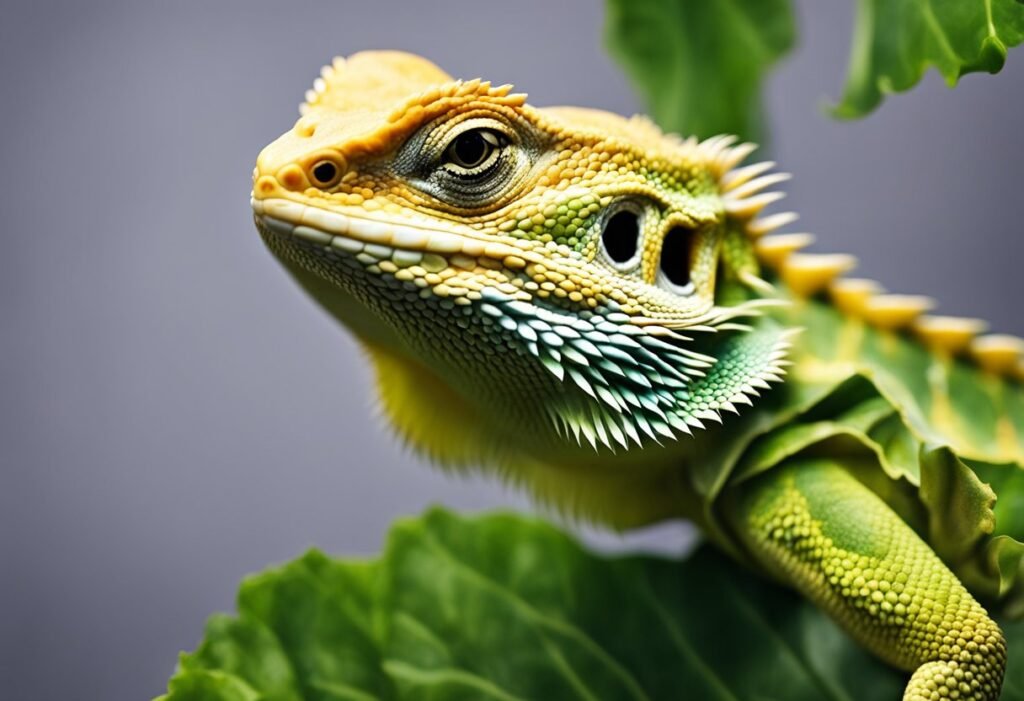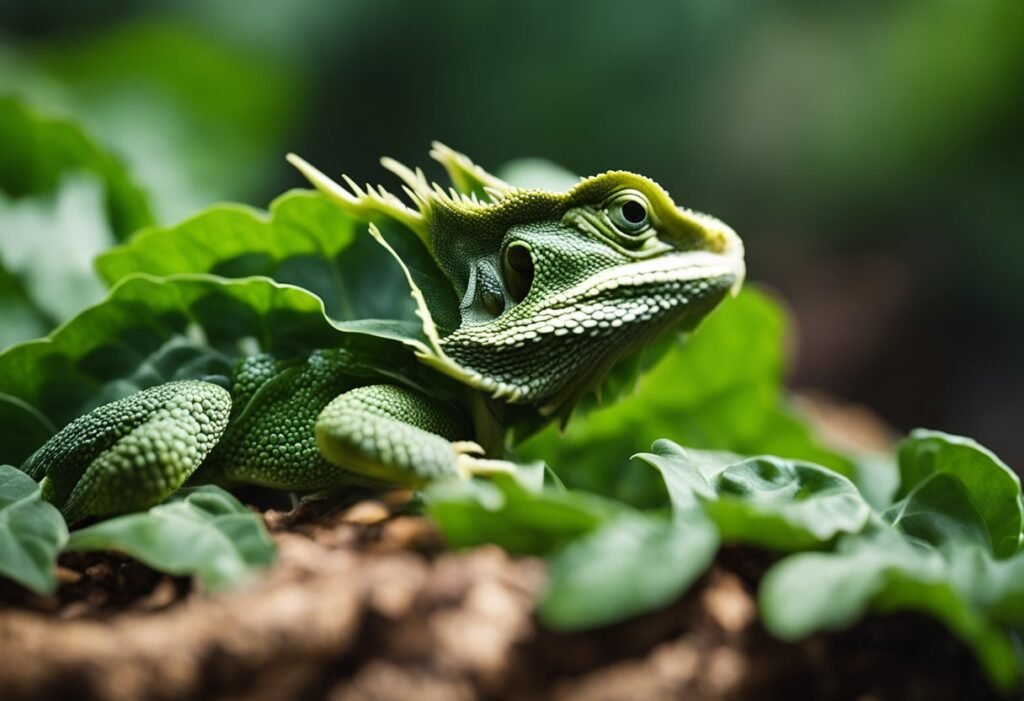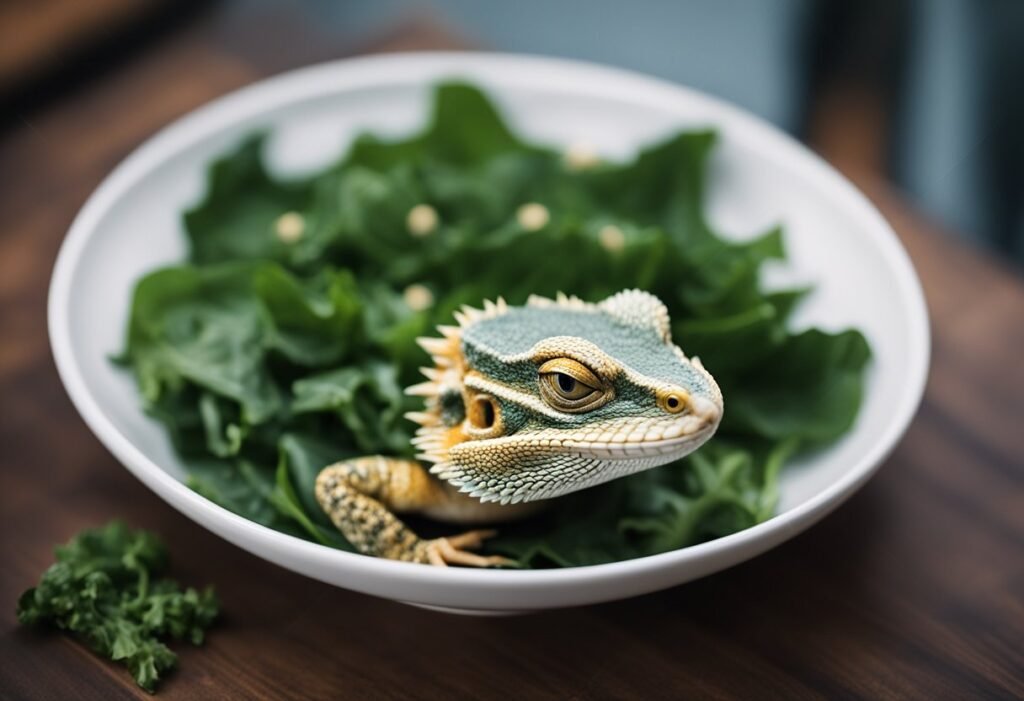Bearded dragons are popular pets that require a balanced and nutritious diet to stay healthy. As omnivores, they can eat a variety of foods, including insects, fruits, and vegetables. However, not all vegetables are safe for bearded dragons to eat. One common question among bearded dragon owners is whether or not they can eat collard greens.
The short answer is yes, bearded dragons can eat collard greens. Collard greens are a nutritious leafy green vegetable that is high in calcium, fiber, and vitamins A and C. These nutrients are essential for a bearded dragon’s growth and overall health. However, it is important to note that collard greens should not be the only vegetable in a bearded dragon’s diet. A variety of vegetables should be offered to ensure that they are getting a balanced diet.
Can Bearded Dragons Eat Collard Greens?

Collard greens are a nutritious leafy vegetable that can be a great addition to a bearded dragon’s diet. They are a good source of calcium, vitamin A, and fiber. However, it is important to note that collard greens should not be the main staple of a bearded dragon’s diet.
As with any new food, it is important to introduce collard greens slowly and in small quantities. This allows the bearded dragon’s digestive system to adjust to the new food and can help prevent digestive issues.
When feeding collard greens to a bearded dragon, it is important to ensure that they are fresh and clean. Bearded dragons can be sensitive to pesticides and other chemicals, so it is best to wash the collard greens thoroughly before feeding them to your pet.
It is also important to note that while collard greens are a nutritious food, they should not be fed exclusively to a bearded dragon. A varied diet that includes a mix of vegetables, fruits, and insects is essential for a bearded dragon’s health and well-being.
In summary, collard greens can be a healthy addition to a bearded dragon’s diet when fed in moderation and as part of a varied diet. As always, it is important to monitor your pet’s health and behavior when introducing new foods to their diet.
Nutritional Value of Collard Greens

Collard greens are an excellent source of nutrition for bearded dragons. They are low in calories and high in vitamins and minerals. Here are some of the key nutrients found in collard greens:
- Vitamin A: Collard greens are an excellent source of vitamin A, which is important for maintaining healthy skin and eyesight.
- Vitamin C: Collard greens are also a good source of vitamin C, which is an antioxidant that helps to protect cells from damage.
- Calcium: Collard greens are a great source of calcium, which is important for maintaining strong bones and teeth.
- Iron: Collard greens are a good source of iron, which is important for healthy blood cells.
- Fiber: Collard greens are also a good source of fiber, which can help to promote healthy digestion.
Overall, collard greens are a nutritious addition to a bearded dragon’s diet. However, it is important to note that they should not be the only food that your bearded dragon eats. A balanced diet that includes a variety of fruits, vegetables, and protein sources is essential for your bearded dragon’s health and well-being.
Health Benefits for Bearded Dragons

Bearded dragons are omnivores and require a balanced diet that includes both animal and plant matter. Collard greens are a nutritious leafy green vegetable that is safe for bearded dragons to eat.
Here are some health benefits of collard greens for bearded dragons:
- High in calcium: Collard greens are an excellent source of calcium, which is essential for strong bones and healthy muscle function in bearded dragons. Calcium deficiency can lead to metabolic bone disease, a common health issue in bearded dragons.
- Rich in vitamins and minerals: Collard greens are also rich in vitamins A, C, and K, as well as minerals like iron and potassium. These nutrients are important for maintaining overall health and preventing nutrient deficiencies in bearded dragons.
- Low in oxalates: Some leafy greens contain high levels of oxalates, which can bind to calcium and prevent its absorption. Collard greens are low in oxalates, making them a great choice for bearded dragons.
When feeding collard greens to your bearded dragon, make sure to wash them thoroughly and remove any stems or tough parts. Offer them in moderation as part of a varied diet that includes other vegetables, fruits, and insects.
Feeding Collard Greens to Bearded Dragons
Collard greens are a nutritious leafy green vegetable that can be a great addition to your bearded dragon’s diet. Here are some important things to keep in mind when feeding collard greens to your bearded dragon.
How to Prepare Collard Greens
Before feeding collard greens to your bearded dragon, it is important to properly prepare them. Here are the steps to follow:
- Wash the collard greens thoroughly to remove any dirt or debris.
- Remove the tough stems and chop the leaves into small, bite-sized pieces.
- Cook the collard greens by boiling them in water for a few minutes or steaming them until they are soft.
- Let the collard greens cool down before serving them to your bearded dragon.
Frequency of Feeding Collard Greens
While collard greens can be a healthy part of your bearded dragon’s diet, they should not be the main source of food. Here are some guidelines for how often to feed collard greens to your bearded dragon:
- For adult bearded dragons, collard greens can be fed once or twice a week.
- For juvenile bearded dragons, collard greens can be fed once every two weeks.
It is important to note that collard greens should be fed in moderation as they contain goitrogens, which can interfere with the thyroid function of your bearded dragon if consumed in large quantities.
Overall, collard greens can be a nutritious addition to your bearded dragon’s diet when fed in moderation and properly prepared.
Potential Risks and Precautions
Overfeeding Collard Greens
While collard greens can be a nutritious addition to a bearded dragon’s diet, it is important to not overfeed them. Overfeeding collard greens can lead to digestive issues, such as diarrhea and bloating. This is because collard greens are high in calcium and can bind with other nutrients in the gut, making them difficult to absorb.
To avoid overfeeding collard greens, we recommend offering them in moderation, as part of a varied diet. A good rule of thumb is to offer collard greens once or twice a week, in addition to other leafy greens and vegetables.
Importance of a Varied Diet
It is important to offer a varied diet to your bearded dragon to ensure they are receiving all the necessary nutrients. While collard greens are a good source of calcium, they should not be the only source of this nutrient. We recommend offering a variety of leafy greens, vegetables, and occasional fruit to ensure a balanced diet.
In addition to offering a varied diet, it is important to provide proper supplementation. Bearded dragons require a calcium supplement, which can be dusted on their food, as well as a multivitamin supplement. Follow the recommended dosage on the supplement packaging to ensure your bearded dragon is receiving the proper nutrients.
Overall, collard greens can be a nutritious addition to a bearded dragon’s diet, but it is important to offer them in moderation and as part of a varied diet. By following these precautions, you can ensure your bearded dragon is receiving all the necessary nutrients for a healthy life.
Conclusion

In conclusion, collard greens can be a healthy addition to a bearded dragon’s diet. They are a good source of vitamins and minerals, especially calcium, which is important for the health of their bones and teeth. However, it is important to feed collard greens in moderation, as too much can lead to health problems such as diarrhea.
When feeding collard greens to your bearded dragon, it is important to wash them thoroughly to remove any pesticides or other contaminants. It is also important to chop them into small pieces to make them easier to digest.
While collard greens can be a healthy addition to a bearded dragon’s diet, they should not be the only food they eat. Bearded dragons require a varied diet that includes a mix of vegetables, fruits, and insects. It is important to consult with a veterinarian or reptile expert to ensure that your bearded dragon is getting the proper nutrition they need to stay healthy.
Frequently Asked Questions
What are the best greens for my bearded dragon?
Bearded dragons require a varied diet that includes a variety of greens. Some of the best greens for bearded dragons include collard greens, dandelion greens, mustard greens, and turnip greens. These greens are high in nutrients and provide a good source of fiber.
What fruits and vegetables are safe for bearded dragons?
Bearded dragons can eat a variety of fruits and vegetables, but it is important to feed them in moderation. Some safe options include apples, blueberries, strawberries, carrots, and squash. Avoid feeding them citrus fruits and vegetables like spinach and kale, which can be high in oxalates.
Can bearded dragons eat mustard greens daily?
While mustard greens are a good source of nutrients, it is not recommended to feed them to your bearded dragon daily. Variety is important in their diet, so it is best to rotate different greens throughout the week to ensure they are getting a balanced diet.
Can bearded dragons eat carrots?
Yes, bearded dragons can eat carrots. Carrots are a good source of vitamin A and fiber, but they should be fed in moderation. Too much vitamin A can be harmful to your bearded dragon, so it is important to balance their diet with other vegetables and greens.
What greens should be avoided when feeding a bearded dragon?
Some greens should be avoided when feeding a bearded dragon, including spinach and kale. These greens contain high levels of oxalates, which can bind to calcium and prevent it from being absorbed by the body. Other greens to avoid include rhubarb and avocado, which can be toxic to bearded dragons.
How often should I feed my bearded dragon greens?
Bearded dragons should be fed greens daily as part of their diet. Greens should make up about 20% of their diet, with the other 80% consisting of protein and vegetables. It is important to provide a variety of greens to ensure they are receiving all the necessary nutrients.
I, Mark Antonelli am highly interested in pet care tips. The experiences I gained through university life in animal sciences were also helpful to identify the best tricks for caring for and feeding varying kinds of pets. I know the majority of people love to own a pet. Yet, there is a guilty of owing a Bearded Dragon due to a lack of information about how much friendly and peaceful they are. I thought of filling this gap with detailed writings about this Pogona genus Bearded Dragon. All my team is also giving me great support to fulfil my mission. Hope you will enjoy the journey with us.

